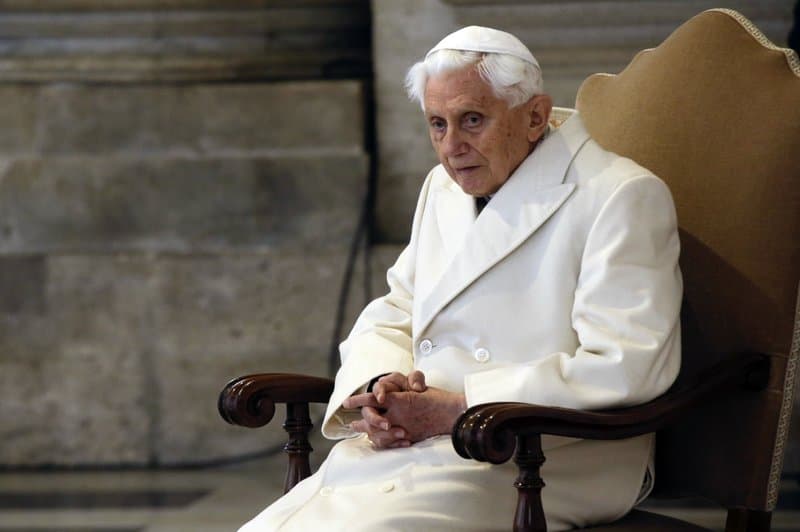ROME – In a rare lengthy interview with a German newspaper, retired pope Benedict XVI reflected on his 70 years as a priest and lamented what he said is an increasing institutionalization of the Catholic Church in Germany, making it a functional entity rather than the living body of Christ.
In written responses to German magazine Herder Korrespondenz, published in their August edition on the 70th anniversary of his ordination to the priesthood, Benedict, 94, said his brief time as a young pastor before getting into academic work made it clear “that many of the functions relating to the structure and life in the church were performed by people who by no means shared the faith of the church.”
Because of this, the Church’s testimony “must appear questionable in many ways,” he said, noting that faith and disbelief “were mixed together in a strange way, and this had to come out at some point and cause a breakdown that would eventually bury the faith.”
Benedict said that in his view, “a divorce was necessary,” in this regard, and cautioned against the idea of thinking of the Church as a body of saints who have already reached perfection.
“That this thought recurring in history is a false dream, which reality always immediately refutes, became particularly clear to me in my Augustine studies on Donatism,” he said, referring to an ancient Christian sect arguing that Catholic clergy had to be faultless in order for their ministry and prayers to be effective, and sacraments valid.
Under this belief, only people who presented themselves as true believers “without any stain” were qualified to become bishops, Benedict said, noting that this idea eventually pushed the sect “more and more into sectarianism and, in fact, proved forever that the church includes wheat and chaff, good and bad fish.”
From a pastoral perspective, then, “it could not be about separating good and bad from one another, but it could be about separating believers and unbelievers,” he said.
Since his pastoral days, the problem of this lack of faith “has become more and more apparent,” he said, insisting that in a swath of Church institutions – hospitals, schools, Caritas offices – “many people are involved in decisive positions who do not support the internal mission of the church and thus often obscure the witness of this institution.”
This seeps into the public and private statements the Church makes, he said, noting that the term “official church” was formulated “to express the contrast between what is officially required and what is personally believed.”
The phrase ‘official church,’ he said, “insinuates an inner contradiction between what faith actually wants and means, and its depersonalization.”
Unfortunately, he said, it is largely the case “that the official texts of the Church in Germany are largely formed by people for whom the faith is only official. In this sense, I have to admit that the term ‘official church’ actually applies to a large part of official church texts in Germany.”
Benedict recalled how while he was a young professor, he had asked a young bishop who was a friend of his to contribute a text to be published in the Catholic magazine Communio, in which the bishop described his work at the bishops’ conference.
“The manuscript he sent us, however, was obviously written by his section and was in fact the language of the apparatus, not the language of a person,” Benedict said, adding, “Unfortunately, this experience was repeated many times later.”
In this regard, Benedict was asked about a speech he made in the southwestern university town of Freiburg in 2011, in which he pointed to a tendency within the Church to place greater weight on “organization and institutionalization” than the Church’s “vocation to openness towards God.”
At the time, Benedict spoke of the need for a “de-worlding” of the Church – a term borrowed from German philosopher Martin Heidegger – meaning it is one detached from worldliness.
In his comments to Herder Korrespondenz, Benedict questioned whether Heidegger’s concept of “de-worlding” was the right term, saying “I don’t know whether I wisely chose the word.”
“What the church has to say ex officio, it says an office, not a person,” he said, noting that “As long as only the office, but not the heart and the spirit, speak in official church texts, the exodus from the world of faith will continue.”
“Therefore, then as now, it seemed important to me to get the person out of the cover of the office and to expect a real personal testimony of faith from the speakers of the Church,” he said.
The concept of “de-worlding” refers only to the negative aspect “of the movement I am concerned with, namely stepping out of speech and the practical constraints of a time into the freedom of faith,” whereas “it is precisely this side, the positive, that is not sufficiently expressed” in the term, he said.
Conducted in early summer 2021, the interview consisted of written responses to questions submitted by German journalist Tobias Winstel and focused largely on Benedict XVI’s brief time as pastor the at Precious Blood church in the Bogenhausen district of Munich after his ordination on June 29, 1951.
When asked if he believed he was a good pastor during that time, Benedict responded, “I don’t dare judge whether I’ve been a good priest and pastor,” but insisted that “I have tried in my own way to meet the demands of my office and ordination.”
At the close of his lengthy and wide-ranging responses, during which he addressed a variety of topics including his experience of hearing confessions, preaching to children, and his own path into academia, Benedict recalled his time at Precious Blood, saying, “Even if I will no longer be able to tread the paths of Bogenhausen in this world, they are a precious piece of my life, which I am sure will also be preserved in the hereafter.”
Follow Elise Ann Allen on Twitter: @eliseannallen












